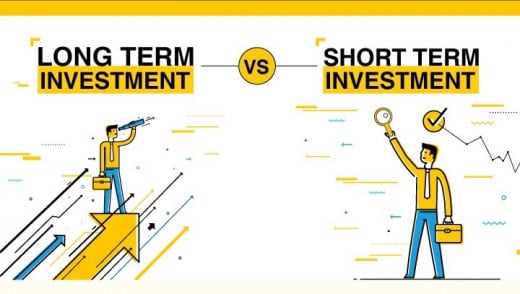Long-Term Investment vs Short Term Investment

Long-Term Investment vs Short Term Investment
When it comes to investing, there are two main strategies - long-term and short-term - both of which have their benefits and drawbacks depending on your financial ambitions and risk threshold.
In this blog post, we will discuss these differences in order to assist you in making an informed decision about which one is suitable for you. The topics that would be discussed include the kinds of investments available, tax implications, potential returns and more. Keep reading to gain further awareness of the comparison between long-term investment and short-term investment!
What is a Long-term Investment?
A long-term investment is an investment made with the intention of holding the asset for a period of years, typically five years or more.
The idea behind a long-term investment is to ride out the ups and downs of the market, allowing the compounding effect of time to work in your favor. Many investors consider long-term investments to be less risky than short-term investments, since there is more time for the market to rebound from any downturns.
There are many different types of assets that can be considered long-term investments, including stocks, bonds, real estate, and mutual funds.
While each asset has its own risk profile, long-term investors typically seek out assets that have the potential for capital appreciation over time. Many also look for investments that offer some level of income along the way, such as dividends from stocks or interest payments from bonds.
The decision of whether to make a short-term or long-term investment should ultimately come down to your financial goals and risk tolerance. If you're looking to grow your wealth over the long haul and can stomach some volatility along the way, a long-term investment may be right for you. On the other hand, if you need quick cash or can't handle any bumps in the road, a short-term investment may be a better fit.
What is a Short-term Investment?
A short-term investment is a way of putting your money into something expecting to receive gains within a relatively brief period. It can be anything from real estate, stocks or even commodities. In any case, you are expecting some kind of return on the amount that you are investing in the near future.
Short-term investments are often employed for the purpose of securing income or taking advantage of prevailing market conditions. Generally thought to be lower risk than those held for more extended lengths, they may offer smaller rewards. These investments typically have a lifespan of one year or less.
Stocks, bonds, mutual funds, and exchange-traded funds (ETFs) are examples of short-term investments. They tend to be more liquid, so they can be sold faster and easier than investments with longer time horizons.
While short-term investments may not offer the same potential for long-term growth as longer-term investments, they can still be a useful part of an overall investment strategy. For example, short-term investments can provide immediate income or help to offset losses from other investments. They can also be used to diversify a portfolio and reduce overall risk.
Short-term investments have the potential to produce lower payoffs but tend to be less dangerous than long-term ones. Generally, these kinds of ventures are held for 12 months or fewer.
Pros and Cons of Long-term Investment
Long-term investment carries several advantages. You can benefit from compounding interest, where the money begins to earn interest on prior accrued returns. This can cause a sizeable surge in your total earnings over time.
Investing for the long term allows you to benefit from enduring market fluctuations, which can be turbulent when considering the short-term. However, by investing in the long run, you can outlast downturns and come out ahead overall.
Although long-term investing certainly has its benefits, it can be limiting in some ways. Your money must remain committed for a lengthy period of time, which prevents you from easily withdrawing it if necessary. You may also miss out on any profit that would have been made in a short timeframe if the market were flourishing.
It's your call to make when it comes to whether long-term investment is suitable for you. If you're ready to commit your funds for the long run, it might be a great method of safeguarding your financial future. Conversely, if you'll need quick access to money in the near future, it might not be ideal.
What is a More Suitable Option for You: Making a Long-term Investment or a Short-term One?
Both long-term and short-term investments have their benefits and drawbacks. Your ideal option depends on the objectives you have, the time you are willing to invest, and your capacity for risk.
For those who wish to build wealth over the long run, investments in the long-term variety are typically less volatile than those of a shorter duration. Though they may provide lower returns, they often offer more stability due to the extended period allowing them to weather market turbulence.
Short-term investments can yield higher returns than long-term ones, but also carry more risk. If you're looking to make a fast return or you don't have huge sums to invest, then this could be the option for you.
No matter what kind of venture you decide to pursue, be sure to thoroughly investigate and comprehend the associated risks before committing any funds.
In conclusion, long-term and short-term investments both have their advantages and disadvantages. Ultimately, the decision as to which type of investment is most suitable for you will depend on your financial goals, risk tolerance, time horizon and budget. Investing in a mix of long-term and short-term investments may provide greater diversification benefits than investing solely in one or the other. Before deciding what type of investments to make, it is important that you understand all aspects involved with both long-term and short-term investments so that you can make an informed decision about what best suits your individual needs.


Comments
Post a Comment